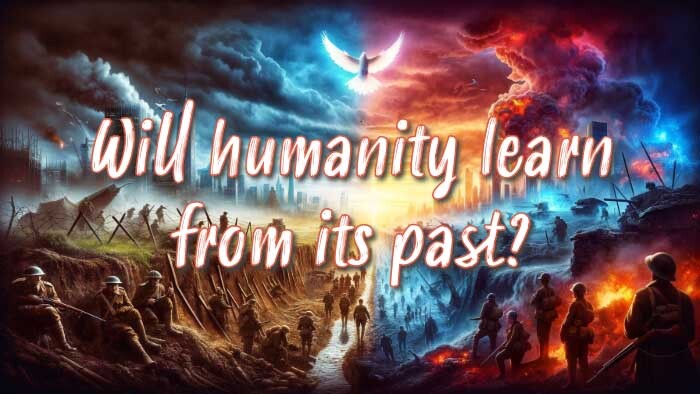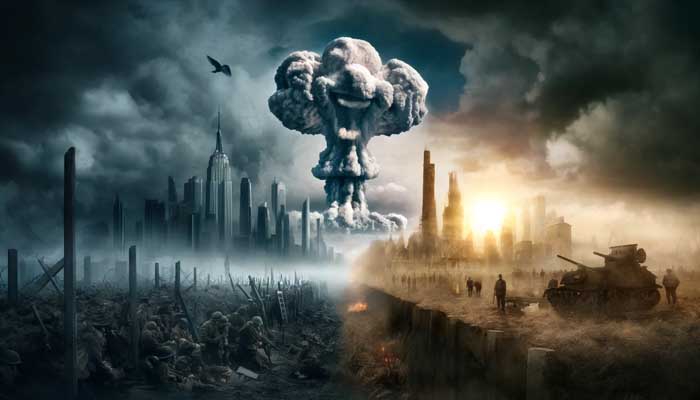
Posted by - News Staff![]() \
\
May 15, 2024 \
Filed in - World at War \
1914 World War1 Archduke Franz Ferdinand of Austria Religion and Ideology: The Perpetual Catalysts \
2.5K views \ 0 reviews
DLNews "Reflective Pause"
In the twilight of an era, a single spark ignited a conflagration that would engulf the world. The year was 1914, and the assassination of Archduke Franz Ferdinand of Austria set off a chain reaction, plunging nations into the abyss of World War I. The Great War, as it came to be known, was a maelstrom of mayhem and destruction, driven by a deadly cocktail of nationalism, militarism, and intricate alliances. As the world watched in horror, millions perished, and empires crumbled, forever altering the course of history.
Fast forward a century, and the specter of war looms large once more. The echoes of the past resonate eerily in the present as the world teeters on the brink of a new and devastating conflict. The parallels between then and now are striking, a testament to the cyclical nature of human folly. The ingredients of this modern-day soup of chaos are disturbingly familiar: geopolitical tensions, religious extremism, and the ever-present threat of cataclysmic weaponry.
The Seeds of Destruction: Then and Now
In the early 20th century, Europe was a powder keg of competing interests and simmering grievances. The assassination of Franz Ferdinand was the catalyst, but the underlying causes of the Great War were far more complex. Nationalism fanned the flames of animosity as nations sought to assert their dominance and protect their interests. Militarism fueled an arms race, with countries amassing unprecedented arsenals in preparation for the inevitable showdown. And the web of alliances, ostensibly designed to maintain peace, instead ensured that any conflict would quickly spiral out of control.
Today, the global landscape is similarly fraught with danger. The rise of nationalist movements has reignited old rivalries and created new ones as countries turn inward and prioritize their own interests over collective security. Militarism has once again taken center stage, with defense budgets soaring and advanced weaponry becoming increasingly accessible. And the network of alliances, far from providing stability, has become a source of tension, as nations navigate a complex and often contradictory web of relationships.
Religion and Ideology: The Perpetual Catalysts
Religion, too, has played a significant role in both past and present conflicts. In the early 20th century, religious differences exacerbated nationalistic fervor as various ethnic and religious groups sought to carve out their own territories and assert their dominance. The Ottoman Empire, in particular, was a hotbed of religious and ethnic strife, its eventual collapse unleashing a wave of violence and upheaval.
In the modern era, religious extremism has emerged as a potent force, driving a wedge between communities and fueling acts of terror and violence. The rise of groups like ISIS and Boko Haram has highlighted the destructive power of radical ideologies as they seek to impose their vision of the world through fear and brutality. The interplay between religion and politics has created a volatile mix, one that threatens to ignite conflicts on a global scale.
The Shadow of the Atom: A New Kind of Terror
Perhaps the most chilling similarity between the past and present is the ever-present threat of annihilation. In 1914, the world had yet to witness the horrors of chemical warfare and the devastating potential of modern weaponry. By the end of the Great War, the use of poison gas and the advent of tanks and machine guns had transformed the battlefield into a nightmarish landscape of death and destruction.

Today, the specter of nuclear warfare hangs over the world, a grim reminder of the catastrophic potential of human ingenuity. The proliferation of nuclear weapons has created a precarious balance of power, one that could be shattered by a single miscalculation or act of aggression. The threat of biological warfare, too, has emerged as a terrifying possibility, with advances in biotechnology raising the specter of engineered viruses and pandemics.
The Lessons of History: A Call to Action
As we stand on the precipice of what could be a third world war, it is imperative that we heed the lessons of history. The parallels between the early 20th century and today are not mere coincidences, but stark warnings of the dangers that lie ahead. The world must come together to address the root causes of conflict, to find common ground and work towards a future of peace and cooperation.
The greatest thinkers of our time must rise to the challenge, to offer solutions and inspire action. It is not enough to merely observe and analyze; we must act with urgency and determination to prevent history from repeating itself. The stakes are too high, the consequences too dire.
In the end, the question is not whether we can avoid a third world war, but whether we have the will and the wisdom to do so. The choice is ours, and the future of humanity hangs in the balance.
"Reflective Pause”
In crafting this narrative, one cannot help but wonder: will humanity learn from its past, or are we doomed to repeat the same mistakes? The echoes of the Great War remind us of the fragility of peace and the ease with which it can be shattered. Perhaps the key lies not in waiting for a savior or a miraculous solution but in fostering a collective self-awareness. As individuals and societies, we must cultivate the ability to critically analyze our actions and their consequences, to question our motives and biases, and to recognize the interconnectedness of our fates.
By embracing a mindset of continuous learning and reflection, we can begin to unravel the complex web of factors that lead to conflict and strife. This self-analyzing approach requires us to be vigilant and proactive, to engage in open dialogue, and to hold ourselves accountable for the state of our world. It challenges us to move beyond complacency and to actively participate in shaping a future where the lessons of history are not just remembered but truly understood and applied.
Let this be a call to action, a plea for introspection, and a testament to the enduring hope that we can, and must, do better. The power to change the course of history lies within each of us, and it is through our collective efforts that we can forge a path towards lasting peace and prosperity.

Desert Local News is an invitation-only, members-based publication built on fact-checked, non-biased journalism.
All articles are publicly visible and free to read, but participation is reserved for members—comments and discussion require an invitation to join.
We cover local, state, and world news with clarity and context, free from political agendas, outrage, or misinformation.
Comments